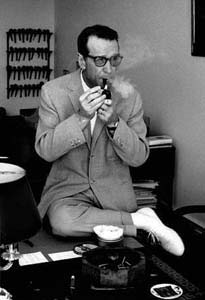A Quote by Elizabeth Moon
In a novel, I could submerge my ego in a characters and let his perceptions take over.
Quote Topics
Related Quotes
Before I begin a novel I have a strong sense of at least one central character and how the story begins, and a more vague sense of where things may wind up, but at some point, if the novel is any good at all, the story and characters take on lives of their own and take over the book, and the writer has to be open to that.
I suppose it's possible that a writer would have feeling for his characters, but I can't see how, because writing is such a meticulous, intricate, technical business. I wish I could say that I love my characters and that frequently they take over the book and run away with the plot and so on. But they don't exist.
Pathology has made us acquainted with a great number of states in which the boundary lines between the ego and the external world become uncertain or in which they are actually drawn incorrectly. There are cases in which parts of a person's own body, even portions of his own mental life - his perceptions, thoughts and feelings -, appear alien to him and as not belonging to his ego; there are other cases in which he ascribes to the external world things that clearly originate in his own ego and that ought to be acknowledged by it.
The ego isn't wrong; it's just unconscious. When you observe the ego in yourself, you are beginning to go beyond it. Don't take the ego too seriously. When you detect egoic behavior in yourself, smile. At times you may even laugh. How could humanity have been taken in by this for so long? Above all, know that the ego isn't personal. It isn't who you are. If you consider the ego to be your personal problem, that's just more ego.
But to be perfectly frank, this childish idea that the author of a novel has some special insight into the characters in the novel ... it's ridiculous. That novel was composed of scratches on a page, dear. The characters inhabiting it have no life outside of those scratches. What happened to them? They all ceased to exist the moment the novel ended.
In his scintillating new novel, Matt Bondurant explores a crucial period in the history of Virginia and of his family. His gorgeous, precise prose brings to life an amazing cast of characters, including Sherwood Anderson, and the often deadly battles of Prohibition. The Wettest County in the World is a remarkably compelling, highly intelligent, and deeply moving novel.
"When you accept your life - when you take your breakfast, and when you sleep and when you walk and when you take your bath - how can you create an ego out of these things? Sleeping when feeling sleepy, eating when feeling hungry, how can you create your ego? No, if you fast, you can create ego. If you are on a vigilance for the whole night, and you say, "I am not going to sleep," you can create the ego. By the morning, the person who has slept well will have no ego, you will have a great ego."
































